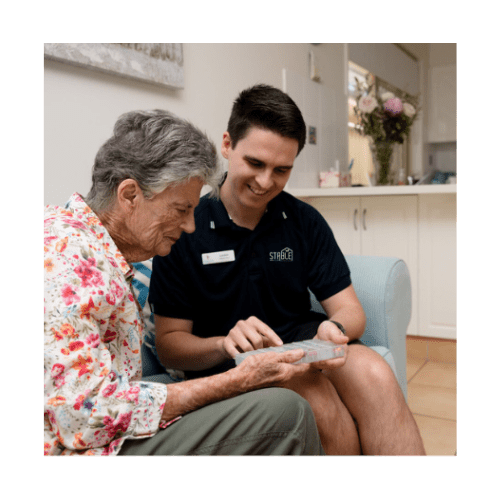Top Home Care Providers in Australia: Discover the most effective In Home Caregivers for Your Requirements
Wiki Article
Just How In Home Treatment Givers Address the Special Difficulties and Emotional Requirements of Families Seeking Support for Their Loved Ones
In-home caretakers play a critical duty in navigating the intricacies faced by households looking for support for their enjoyed ones. By comprehending one-of-a-kind household dynamics and supplying tailored emotional support, these professionals not just address instant care requirements yet likewise cultivate an atmosphere of depend on and open communication (home care providers).Comprehending Family Characteristics
Understanding family members dynamics is essential for giving efficient in-home care, as each family members operates within an unique collection of interactions and relationships. These characteristics include numerous aspects, consisting of interaction designs, functions, and class structure that affect how treatment is provided and received. The caretaker should acknowledge these variables to guarantee that treatment strategies line up with the family's assumptions and worths.Various family members might show distinct patterns of communication, such as joint strategies or ordered structures. In some households, a main decision-maker might hold substantial influence, while in others, choices might be a lot more autonomous. Recognizing these patterns helps caregivers customize their strategies to fit the family's certain requirements.
Furthermore, cultural backgrounds play a crucial function in forming household characteristics. Caretakers must be culturally qualified, acknowledging and appreciating varied methods and ideas that might influence care choices.
Eventually, a comprehensive understanding of family members dynamics promotes improved communication, cultivates depend on, and improves the caregiver's capacity to sustain the family effectively. By recognizing the complex web of relationships and responsibilities, caregivers can create an encouraging atmosphere that promotes health for both the individual obtaining care and the family members in its entirety.
Providing Emotional Assistance
Offering psychological support is a necessary component of in-home care that dramatically enhances the health of both the individual getting care and their relative. In the context of caregiving, emotional support entails energetic listening, empathy, and validation of feelings. Caretakers are educated to recognize the emotional struggles that households encounter, such as shame, anxiety, and isolation, and to supply a compassionate existence that minimizes these worries.By fostering open interaction, caretakers create a secure room for relative to share their fears and issues. This discussion not only encourages psychological launch however also reinforces trust in between the caregiver and the family members. Additionally, caretakers can provide sensible strategies to help households manage stress and anxiety and advertise resilience.

Inevitably, the emotional support given by at home caregivers enhances the lifestyle for both customers and their households, promoting an extra caring and understanding caregiving environment. This all natural strategy makes sure that emotional demands are attended to together with physical health considerations.
Managing Daily Care Tasks
Handling day-to-day care tasks is an essential element of in-home care that makes sure individuals obtain the support they need to keep their health and self-reliance. Caretakers play a crucial duty in helping with activities of everyday living (ADLs), that include bathing, clothing, brushing, and meal prep work. By handling these responsibilities, caretakers help ease the psychological and physical burdens that households might deal with while looking after their loved ones.
In enhancement to personal care, caregivers are additionally tasked with drug management, making sure that customers abide by prescribed timetables and does. This oversight is crucial for maintaining wellness and protecting against damaging results from missed or inaccurate medicines. Additionally, caretakers usually assist with wheelchair, providing support for clients walking around their homes, thereby reducing the threat of drops and boosting general safety and security.

Fostering Open Interaction
Reliable administration of everyday care jobs frequently depends upon the quality of communication between caregivers, clients, and their families. Open up interaction fosters a setting where issues, choices, and feedback can be openly exchanged, ensuring that treatment is tailored to satisfy private demands. Caregivers need to prioritize routine check-ins with both customers and their households, promoting look at here discussions that resolve any concerns or changes in treatment requirements.Using numerous communication methods-- such as in person conferences, telephone call, and composed updates-- can boost understanding and provide households with tranquility of mind. It's important for caretakers to linked here proactively pay attention, demonstrating compassion and regard for the emotional landscape of the household. Urging questions from member of the family can also assist make clear treatment plans and reinforce the caregiver's dedication to transparency.
Additionally, keeping open lines of communication makes it possible for caregivers to acknowledge and respond quickly to any type of changes in a customer's health and wellness standing or emotional health. This aggressive method not just strengthens the caregiver-client vibrant yet likewise encourages family members to participate actively in the treatment procedure. Ultimately, promoting open interaction is important for boosting the quality of in-home treatment and advertising a supportive atmosphere for all involved.
Building Count On and Relationships
Depend on is the cornerstone of successful in-home treatment, as it establishes a structure for purposeful partnerships in between caretakers, clients, and their households. Building this depend on calls for consistent, transparent communication and a real dedication to the well-being of those entailed. Caregivers must show dependability via punctuality, adherence to care strategies, and responsiveness to the requirements and preferences of customers.To promote depend on, caregivers must participate in active listening, guaranteeing that families really feel click here for more listened to and understood. This involves not just dealing with immediate problems however also preparing for future requirements, thereby encouraging households and boosting their feeling of control. Developing relationship through shared experiences and considerate interactions can further strengthen these connections.
Moreover, caretakers need to be trained to recognize and resolve the emotional intricacies encountered by households. By showing compassion and empathy, they can alleviate unpredictabilities and anxieties, strengthening count on. Regular updates and check-ins with member of the family can likewise boost transparency, allowing them to really feel engaged and notified about their loved one's care.
Ultimately, building trust and nurturing partnerships in in-home care is a joint procedure that significantly influences the quality of treatment offered, cultivating a helpful environment that profits everybody involved.
Final Thought
By comprehending family characteristics, supplying psychological support, and promoting open communication, caretakers improve the general caregiving experience - ndis plan manager. Their ability to handle day-to-day treatment jobs while developing count on and solid connections cultivates a helpful setting for customers and their households.Understanding household characteristics is important for supplying effective in-home treatment, as each household operates within a distinct collection of relationships and interactions.Supplying emotional support is a vital element of in-home treatment that dramatically enhances the health of both the individual obtaining treatment and their household members. By taking on these obligations, caretakers assist relieve the psychological and physical worries that families might encounter while caring for their enjoyed ones.
Effective management of daily care jobs frequently hinges on the top quality of communication between caretakers, customers, and their families - home care providers australia.Trust fund is the keystone of successful in-home care, as it develops a foundation for purposeful connections in between caregivers, customers, and their households
Report this wiki page